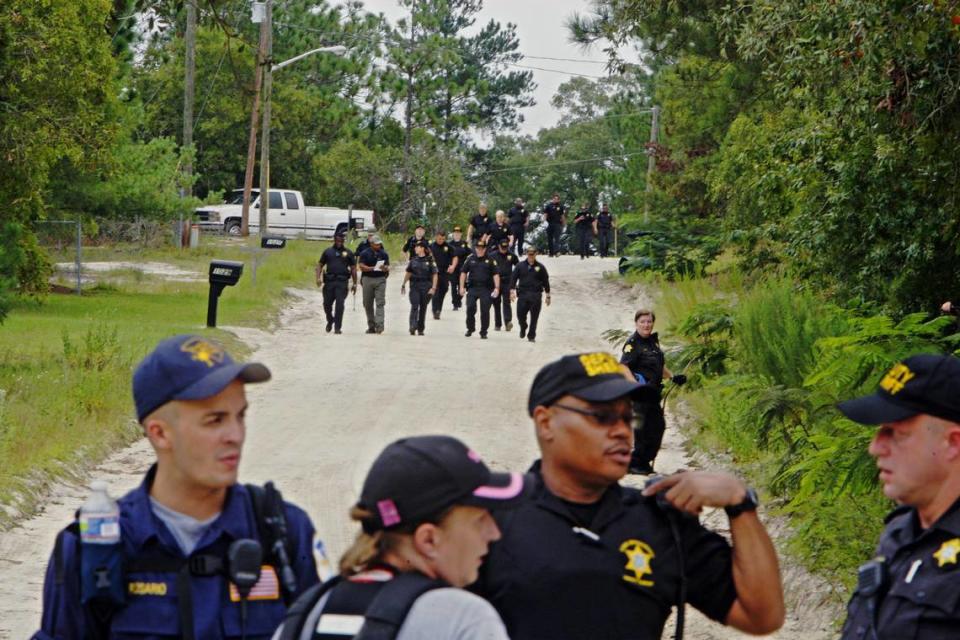Confessed SC killer’s first wife tells of abuse she suffered, ‘He wanted long-term damage’
- Oops!Something went wrong.Please try again later.
On the night she jumped from a second-floor window to escape her husband, Juanita Jackson knew she had to get a divorce.
Her entire life, Jackson had been terrified of heights. But that night, one fear was greater: Her husband, Freddie Grant.
Decades before South Carolina law enforcement officials labeled Grant a “boogeyman” and “monster” for his involvement in the disappearance and murder of two women, he exhibited a pattern of criminality, violence and control, Jackson told The State Media Co.

In her conversations with The State, Jackson described how Grant physically abused her over the course of a decade-long relationship. The abuse began shortly after she gave birth to their daughter at the age of 17. Grant, 12 years her senior, punched and threatened her with weapons. One time, he cracked her over the head with a heavy, military-issue flashlight, nearly splitting her skull, she said. To this day, Jackson’s left eye is still damaged from repeated beatings.
Over the three decades they knew each other, Grant was repeatedly charged with crimes that ranged from drug trafficking to aggravated battery. He was repeatedly jailed, spending more than 10 years in prison across three states, as he bounced between family and relationships in Florida and South Carolina.
Today, Grant is in prison after pleading guilty in 2013 to abducting and killing 15-year-old Gabriela “Gabbiee” Swainson of Blythewood, the daughter of a woman with whom he was involved.
Following Swainson’s disappearance, Grant was named a person of interest in the shooting death of his neighbor, Daniel Lee Woods Jr., in Kershaw County. Grant has not been charged in Woods’ death.
In February, Grant was charged with murder after the remains of his girlfriend, Adriana Laster, were found in a Richland County sandpit. Laster had been missing since 2011. Other warrants charge Grant with multiple instances of domestic violence against Laster.
“When they found Adriana, I went through depression, a shutdown. I’m just waking up,” Jackson said. When reports of Laster’s disappearance began circulating in 2012, Jackson remembered believing that Grant had killed her. “He had done things to me that were close to that.”

Grants attorneys said that they had no comment about Jackson’s allegations.
Jackson’s experience with Grant may be extreme, but nationally between a third to half of all female homicide victims are killed by their intimate partners. The story that Jackson shared with The State is not just an exclusive look at a killer that has become infamous in the Midlands, but a snapshot of how violence against women from their intimate partners repeats, escalates and too often ends in unimaginable tragedy.
‘He said all the right things.’
When Jackson met Grant, he was 24 and she was just 16. It was 1984 and she was in high school, where she danced, played volleyball and was enrolled in honors classes. She had grown up in the neighboring cities of Homestead and Florida City, part of suburban Miami, near the Everglades. It was a small community, and Jackson and her siblings were close with the Grant kids. Jackson used to hang out and make prank phone calls with Grant’s younger brother.
At the time, she was excited that she had met an older, handsome military veteran just home from the Army. He began to help Jackson with her honors English homework.
“That’s how he conned his way in,” Jackson said. Her family liked Grant, she said. He was smart and intense, and he could charm people. “He’s very cunning, he’s very convincing,” Jackson said.
Shortly after Jackson turned 17, Grant — then 29 — convinced her to have sex with him for the first time. Nine months later she gave birth to their daughter, Dominique Grant.
But the violence began to show shortly after Dominique’s birth, and the relationship became an ugly cycle of control and violence.
“He wanted long-term damage. He wanted to destroy my face so no one would ever look at me,” Jackson said. Grant liked to target her left eye, Jackson said, hitting it over and over again and leaving permanent damage to the retina.
Jackson gradually learned the truth about Grant’s time in the Army. Far from being a war hero, Grant had been dishonorably discharged, according to court records. His last posting was as an inmate at the United States’ military prison at Fort Leavenworth, Kansas.
At first, Grant downplayed his Army troubles, Jackson said. He was 17 at the time, and told her that he had gone AWOL in an attempt to get out of the Army. Later he admitted to getting into a fight with a white officer. But he justified it, saying they were caught up in a love triangle with a Korean woman. One night, Grant told her, the jealous officer chased the couple, which led to a fight.
Court records show Grant was arrested after he slashed a man across the face with a razor blade. During his arrest, Grant kicked an officer in the chest. Months later, while being transported under armed guard, Grant overpowered the officials, taking an M-16 rifle from one of the guards. Grant held the officials at gunpoint and forced them to drive him to another location, firing the gun at least once, according to court records. Grant then fled, but was recaptured the next day.
At his court martial in May 1980, Grant was convicted of assault resulting in grievous bodily harm, resisting apprehension, assault upon a person in the execution of official duties, and kidnapping two people.
Grant was dishonorably discharged from the Army, ordered to forfeit all pay and sentenced to eight years and nine months in Leavenworth. He was paroled and returned to Homestead, Florida, in 1984, where he met Jackson.
In 1988, Grant was sent back to prison for violating his parole after he was charged with aggravated battery in the beating of Jackson.
“He had beat me so bad,” Jackson said of the incident. But, still she was protective of Grant and tried to have the charges dropped. “It was typical for a victim ... I went to his parole officer and tried to tell him, ‘Listen, it was a misunderstanding.’ He was like ‘No!’ And I thank God that he saw through it.”
“He said ‘He’s going back to prison.’ He said, ‘Look at your eye, do you see how you look?’”
In 1989, with Grant in prison and Jackson needing to provide for her daughter, she joined the Army. She went through basic training at Fort Jackson. Throughout, Grant was writing to her. He said he knew he was troubled but that he was getting help.
“He said all the right things,” Jackson said. So when she received orders to go to Germany in 1989, she took her daughter and Grant, recently released from prison, as dependents.
It proved almost immediately to be the wrong decision.
One day, not long after they arrived, Jackson said that Grant became jealous when a male soldier helped her bring some groceries into their off-base apartment. He accused her of “doing something with the soldier sexually,” Jackson said.
“That night he tortured me,” Jackson said.
Her downstairs neighbors called the local German police, and Grant fled into the night. Believing she was safe, Jackson said that she made dinner. As she was giving her daughter a bath, Grant suddenly appeared in the bathroom. He had climbed up to their second floor patio and entered through a patio door. In his hand was the bat he had bought her to play softball.
“He said, ‘If you try anything, I’m going to beat you to death,’” Jackson said. Trapped in the bathroom, Jackson remembered the smoke slowly filling the house as a pot she left on the stove began to burn. For a moment, she said, part of her wanted the apartment to burn down.
Instead she pleaded with Grant to let her turn off the stove. Then, making as if she was going to empty the pot off of the patio, Jackson threw herself from the second floor. She took off down the street screaming “Polizei! Polizei!” Grant fled the apartment again, leaving their daughter behind.
“When I faced that fear of jumping off the second floor and landing on my feet and surviving, I think that gave me the courage. Don’t ever go back,” Jackson said. “When something forces you to face your biggest fear under those kinds of circumstances, that’s when you know enough is enough.”
But it wasn’t enough to end their relationship entirely. Jackson said that Grant wasn’t arrested in Germany; instead she said the Army gave him a plane ticket and told him to return to the United States.
Over the next two decades, Grant traveled back and forth between Florida and the area around Columbia, South Carolina, where some members of his family had settled.
His movements over these years can be traced in arrests and court records. In 1990, Grant was charged with cocaine trafficking in Miami-Dade County, but prosecutors declined to prosecute the case.
In January 1992, while Grant was out on bond following an arrest for cocaine distribution in Richland County, South Carolina, police onboard an Amtrak train in Florida searched Grant’s bag and found a loaded pistol. Grant then fled, according to court records, throwing down a bag of cocaine.
Jackson admits she tipped off authorities about Grant’s cocaine trafficking to get back at him for running up a $14,000 overdraft at the base store in Germany.
“I wanted to get my licks in,” Jackson said. But for the most part, during these years, Grant was “out of sight, out of mind,” as Grant was in and out of prison.
Following that arrest, Grant was convicted in Miami-Dade County of possession of cocaine, resisting arrest without violence and carrying a concealed firearm. In May, 1992, he was sentenced to two days with credit for time served.
Two months later, Grant was sentenced to eight years in prison on his South Carolina charges. While in prison he worked various jobs, including as an electrician, a laundry room attendant, a ward keeper and a cook. He won a certificate from the National Issue Forum, a civic engagement group, and in September 1993 he was awarded Student of the Month, according to records from the state Department of Corrections.
In January 1995, Grant was granted parole in South Carolina and returned to Florida. By March, Jackson had filed three domestic violence charges against Grant in Miami-Dade County Family Court and decided that she needed to make good on her promise to divorce Grant.
The next July the same court granted an uncontested divorce.
“That guy took a lot from me,” Jackson said. “I don’t look at myself as a victim, I look at myself as a warrior. I went through stages: I was a victim, and then I started healing and said ‘OK, you’re a survivor.’ Then I went through the process of getting myself back, learning to love myself again. And once I learned myself, I learned to love others correctly.”
“Now I have got to the age and the stage that I am a warrior. But it’s a process.”
“You best be careful.”
On November 9, 2010, Freddie Grant choked and punched Adriana Laster in the face before dragging her, leaving scrapes and bruises across her body, according to a warrant filed by the Elgin Police Department in South Carolina. The next April, another warrant accused Grant of dragging Laster again and causing her to fall, cutting her head open, before he hit her in the mouth.
By then, the two had been living together in South Carolina for over a year. Laster was in her early 20s when she started dating Freddie Grant, who was in his mid-40s. She was only a few years older than his daughter, Dominique.
Laster had a daughter of her own, Crystal, from a previous relationship. Like Jackson, she was just 17 when she gave birth.
But where Jackson was motivated and self-assured, Laster struggled. Court records show that between 2005 and 2007 she was arrested five times in Miami-Dade County. Most of the arrests were for misdemeanors, including possessing drug paraphernalia and trespassing. In 2007 she was charged with a felony for cocaine possession.

Crystal was raised by her dad and grandmother, Phylis Horn, but Laster always kept in close touch with her daughter. Horn remembered that Laster regularly called her daughter and sent cards. On Crystal’s third birthday, Horn remembers looking at Laster and thinking, “You could just look at her and tell how much she loved her baby.”
In the mid-2000s, Laster moved from Homestead to Key West, where she met Grant.
The couple moved up to Elgin around 2009, where Grant worked as a handyman and electrician. He was a regular at Elgin Town Council meetings, and even once ran for a position on the council.
They lived in Grant’s home at 1009 Kelly St. in Elgin. The brick, one-story home stood off of a sandy, dirt road. Across the street was the home of Mabel Rotan, the mother of his second wife, Ollie Rotan Grant, who died in 2004. Next door was an abandoned junkyard.
Grant’s home had been seriously damaged in a fire in 2006, and was “pretty much uninhabitable” afterwards, according to court testimony from Dominique. The walls were still standing, but the inside was heavily damaged by soot.
Once, while trying to reach Dominique, Jackson said she remembered Laster picking up the phone and accusing her of trying to get her ex-husband back.
“‘Now sister you best be careful,’” she remembers saying
“‘Oh, you just want him back,’” Laster replied.
“No, no, no you best be careful,” Jackson said.
The warrants filed against Grant allege that the violence escalated in the months leading up to Laster’s disappearance.
In June, 2011, Grant allegedly put Laster into a chokehold and dragged her into his vehicle before knocking her unconscious with a punch to the back of her head. Regaining consciousness while the car was on Interstate-20 in Lexington County, Laster fought with Grant to escape the car, only succeeding when she grabbed the steering wheel and forced the vehicle off the road, according to a warrant.
Witnesses said Laster told them that Grant was going to kill her, according to one warrant.
But Laster did not leave Grant. On Labor Day Weekend 2011, neighbors told reporters that they saw her walking down Kelly Street on her way to church. It was the last time she was seen alive.
As the months of silence stretched on, Horn feared the worst. Along with Laster’s aunt, she filed a police report. They spoke with detectives and they waited. Over the years, they held vigils and prayed for Laster’s return.
In 2013, Grant’s daughter, Dominique, was charged as an accessory in Swainson’s murder. To secure her release, Granbt led investigators to where he buried Swainson’s body and ultimately pleaded guilty to her murder. But he remained silent about Laster, and she officially remained a missing person.
“I knew, well I felt that she was deceased, because she had stopped contacting Crystal,” Horn recalled. “That was the red flag there, that everybody knows something is wrong and has been wrong.”
In January, a worker quarrying sand near Elgin spotted bones in the dirt. For the next few weeks, the entire site was shut down while law enforcement officers and coroners painstakingly combed through the earth. In the end they turned up part of a skeleton and a few scraps of Laster’s clothes. But after more than a decade, it was enough to say for sure what many had long believed: Adriana Laster was dead.
“I’m still fighting some demons, some nightmares of how close I was to being where Adriana was,” Jackson said.

